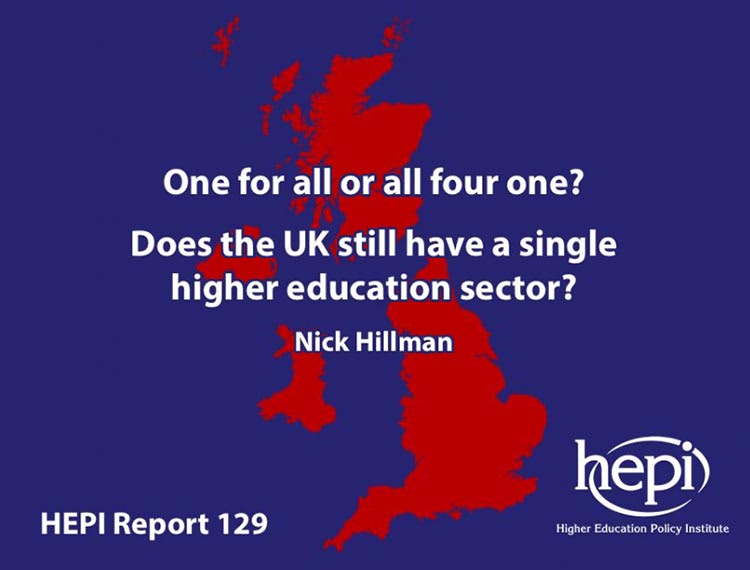Does the UK still have a single higher education sector?

The Higher Education Policy Institute (HEPI) has used evidence from nearly 60,000 full-time undergraduate students across the UK to answer the question of whether there is still a single UK higher education sector.
One for all or all four one? Does the UK still have a single higher education sector? by Nick Hillman compares the results from local students studying in England, Scotland, Wales and Northern Ireland across seven different issues:
- value
- finance
- wellbeing
- accommodation
- pedagogy
- workload
- regrets
The results reveal both differences and similarities in the student experience in each of the four parts of the UK.
- Students from England studying in England seem to work a little less hard than those elsewhere in the UK. This is in contrast to much political rhetoric on the English funding system, although it may be partly explained by a different subject mix among students.
- Students from Scotland studying in Scotland have notably different opinions on funding to local students elsewhere in the UK, with a higher proportion (but still under half) thinking higher education should be free and a greater proportion believing they are receiving ‘very good’ value for money. While this reflects the funding regime in place in Scotland, student wellbeing is no higher among students in Scotland than elsewhere.
- Welsh students studying in Wales are more positive about the staff who teach them than those elsewhere in the UK – for example, 60% of local students in Wales say all or a majority of their teaching staff motivate them to do their best work, compared to 52% in England, 51% in Scotland and 53% in Northern Ireland. Although the differences are sometimes modest, local students in Wales score their staff more highly across a range of positive attributes.
- Students from Northern Ireland studying in Northern Ireland provide more positive responses on all four wellbeing questions than those elsewhere in the UK, confirming other evidence suggesting more positive wellbeing in Northern Ireland. However, as Northern Ireland has just three universities (Queen’s, Ulster and the Open University) and two university colleges, the number of respondents from Northern Ireland is lower than for the other parts of the UK.
Nick Hillman, Director of HEPI and the author of the report, said:
Students in England seem to work less hard than those elsewhere in the UK. Students in Scotland have more positive perceptions about the value of their course and are more likely to believe higher education should be free. Meanwhile, students in Wales tend to think more positively about their academics and students in Northern Ireland are more content, with higher levels of wellbeing.
Many of our results are surprising. Policymakers in England have often tried to portray high tuition fees as offering more student choice and a better student experience. Policymakers in other parts of the UK have tended to regard lower student debts as a way to improve student wellbeing. Both these claims are pooh-poohed by the results from students themselves.
Nonetheless, it is easy to exaggerate the scale of any differences. The most important finding overall is that any differences in the student experience in different parts of the UK are fairly modest.
Despite increasing devolution and increasingly divergent policies, there is still more that unites higher education institutions across the UK than divides them. The current Covid-19 crisis is bringing this home, as higher education institutions across the UK are all facing the same new challenges.
The fieldwork for this report and most of the writing up were completed before the current Covid-19 crisis. HEPI is continuing to produce written reports and blogs, including on the crisis itself, but our programme of events is temporarily on hold and all of the HEPI team are working from home, in line with official advice.











Responses